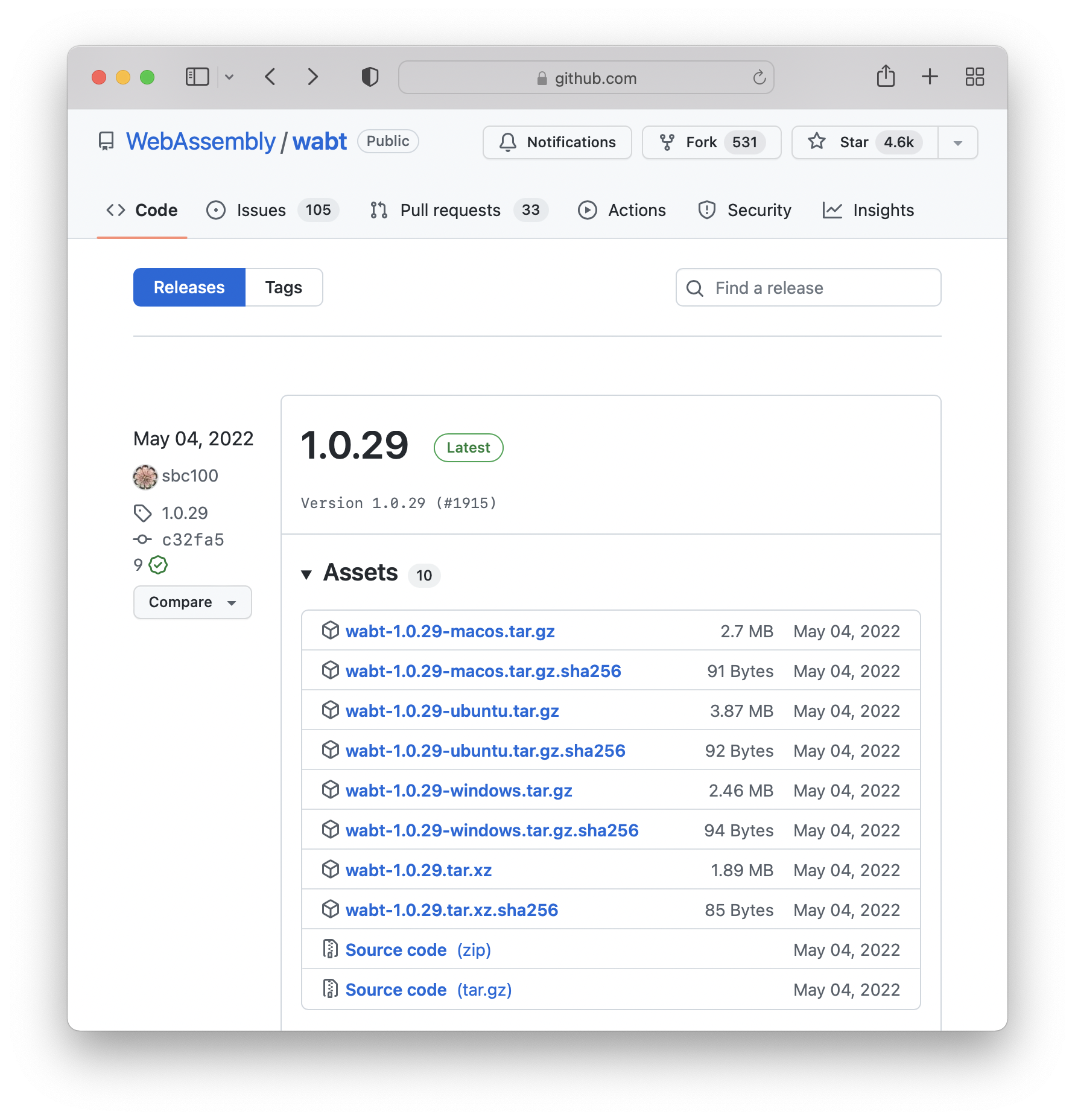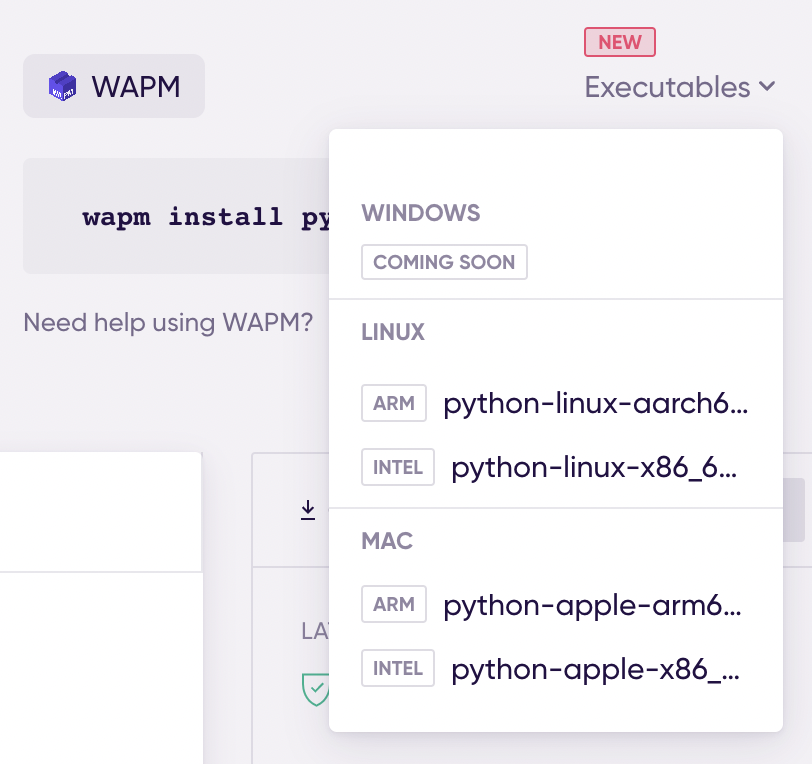

August 19, 2022
WebAssembly as a Universal Binary Format (Part II: WAPM)
WebAssembly as a Universal Binary Format (Part II: WAPM)
Syrus Akamin
Founder & CEO
In the first article in this series we demonstrated how you can create standalone executable files from WebAssembly WASI files that will work in any operating system; which means we can create a python.exe (or python.out) from a python package, without depending on any WebAssembly Runtime at all (see the Python package on WAPM)!
This was great and very well adopted by the community, but we were missing one big part of the picture: how can we use this new feature to improve the life of developers?
TL;DR: Using the wasmer compiler we compile all WASI packages published to WAPM to a native executable for all available platforms, so that you don't need to ship a complete WASM runtime to run your wasm files.
But how is this useful for the developers and tech companies?
First, let's analyze some of the problems when distributing applications to your users:
Creating a binary for each platform sucks… it really does!
Right now, if you are using Rust, Go, Zig or C/C++ (among others) you will usually need to install a whole toolchain/SDK to create a binary for each platform. Creating binaries for each platform is painful (in some languages more, in some less) and it takes time. Why? Well, you need to:
- Find the toolchain (it might not exist - try to generate a macOS executable from a Linux system for a C project!)
- Install the toolchain in your system (in some cases the toolchains will only run in a specific platform/chipset, so you will also need to set up a VM to run the toolchain)
- Adapt some of your application code to make sure it works properly in the desired operating system
- Generate a binary
- Repeat for each platform and hope it works!
Also, what about doing this retroactively? Let's say you created an application 2 years ago that was able to run on an Intel chipset - how you can make the same old software now run on ARM? You'd need to recompile everything, making sure the old dependencies used are still available in your current system and hoping that the compilation will be merciful with you and no compilation errors have to be fixed for the new target.
Portable Executables
There are also other interesting solutions that developers have used to create portable executables.
One of the most popular ones has been via ape/cosmopolitan, as it allows to create executables that are “αcτµαlly pδrταblε εxεcµταblε”:
So, how is this approach different? ape is aiming to create one standalone binary that works everywhere (same chipset, x86 as lingua franca). On the other hand, Wasmer aims to have one standalone lingua franca (Wasm), that can target multiple OSes (macOS, Linux, Windows), chipsets (x86, ARM, RISC-V) and programming languages (Python, Rust, Go…).
On one hand, both ape and Wasmer rely on a “universal binary interface” to interact universally with the Operating System: Cosmopolitan (as a universal libc POSIX interface) in the case of ape, and WASI in the case of Wasmer.
On the other hand, since Wasmer relies on WASI it can also offer a full-sandboxed execution when running the binary (this means that by default no files or sockets could be accessed or created by the binary unless explicitly allowed, for example).
Edit (Sept 23, 2022): Cosmopolitan Libc actually allows sandboxing on Linux and OpenBSD via kernel support, as pointed out by Justine.
To sum up: one Wasm WASI file generates a sandboxed binary for each of the items of the OS/chipset matrix.
Distributing binaries is painful
Even once you created multiple binaries, you still need to distribute them and make sure they are accessible for people to use.
A method most developers use is Github Releases. Here’s how WABT (a WebAssembly binary toolkit with multiple executable utilities) used Github for their latest release (version 1.0.29):

However, this approach usually means integrating the “Build process” inside of your CI process. That is, you have to build it from multiple operating systems.
Furthermore, while Github is great, it all revolves around the source code, which requires a whole toolchain to be able to build a binary.
Not only that… if we look closely we can see that wabt is missing the binary for the new macOS ARM chipsets (M1/M2)!
At Wasmer, we believe there are better ways of distributing software, in a way that is universal for any package and completely agnostic of the toolchain needed, so you can retroactively create new binaries for the same software when new targets emerge.
What we need to improve
There are a few things that we are still working to improve, namely:
- Windows support is on-going (it'll be ready soon... stay tuned!)
- The generated executables are a bit fatter than they should be. Currently we are embedding a fat static archive "libwasmer.a" in the executable. Ideally we will only include
libwasmer-headless.awhich should only weigh a few Mbs more than their Wasm counterparts.
WAPM
First, we identified all the WASI packages from WAPM that can be created as standalone applications (Zig, Python, Trealla, ...).
Then we automatically created and published standalone binaries for each of the platforms that Wasmer supports, so people can start using your software right away (now, or in the future: you will no longer need to keep track of dependencies, supported platforms or chipsets!).
So, if you are using Python, there is a python WAPM package that you can run either via Wasmer (requiring you to install it via the wapm cli), or in a completely standalone way!

Executables in the Python Python package page
You're using the new macOS M1 machines? → python-apple-arm64-0.1.0.tar.gz
You're using Linux? → python-linux-x86_64-0.1.0.tar.gz
You're on Windows? → stay tuned! We're working on it ;)
$ tar -xvf python-*-0.1.0.tar.gz
$ ./python
Python 3.6.7 (default, Feb 14 2020, 03:17:48)
[Wasm WASI vClang 9.0.0 (https://github.com/llvm/llvm-project 0399d5a9682b3cef7 on generic
Type "help", "copyright", "credits" or "license" for more information.
>>>
Et voilá!
We believe Wasmer will make every package developers target WebAssembly first, and let WAPM and Wasmer target every operating systems and chipsets automatically. No more effort for the developer - welcome to a new way of handling binary distributions at ease thanks to WebAssembly and Wasmer!
About the Author
Syrus Akbary is an enterpreneur and programmer. Specifically known for his contributions to the field of WebAssembly. He is the Founder and CEO of Wasmer, an innovative company that focuses on creating developer tools and infrastructure for running Wasm
Syrus Akamin
Founder & CEO
Creating a binary for each platform sucks… it really does!
Portable Executables
Distributing binaries is painful
What we need to improve
WAPM
Deploy your web app in seconds with our managed cloud solution.
Read more
wapmwebassemblyregistry
WebAssembly as a Universal Binary Format (Part I: Native executables)
Syrus AkaminAugust 8, 2022
wapmwasmer registryengineeringregistry
WAPM: A Newly Renovated Home For WebAssembly
Syrus AkaminMarch 2, 2022
wapmengineeringregistry
Introducing Markdown Playgrounds - Powered by WebAssembly
Syrus AkaminApril 22, 2022
dynamic-linkingwasixwebassembly
Dynamic linking in WebAssembly with WASIX
Arshia GhafooriFebruary 11, 2026